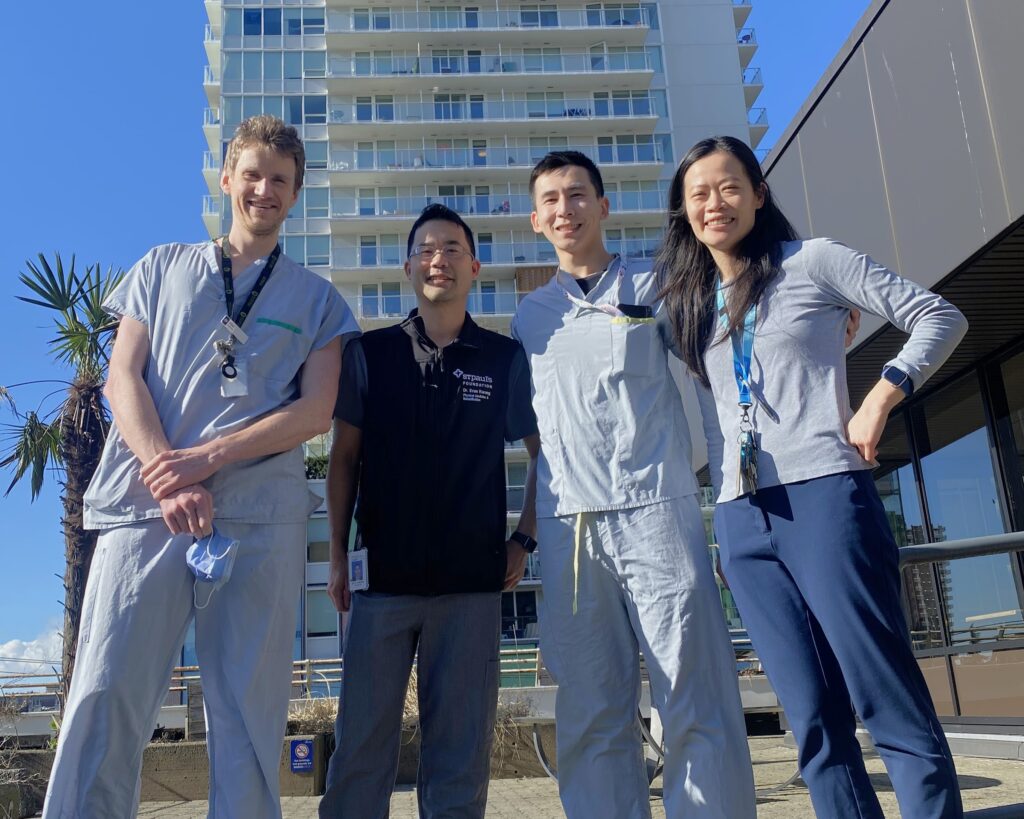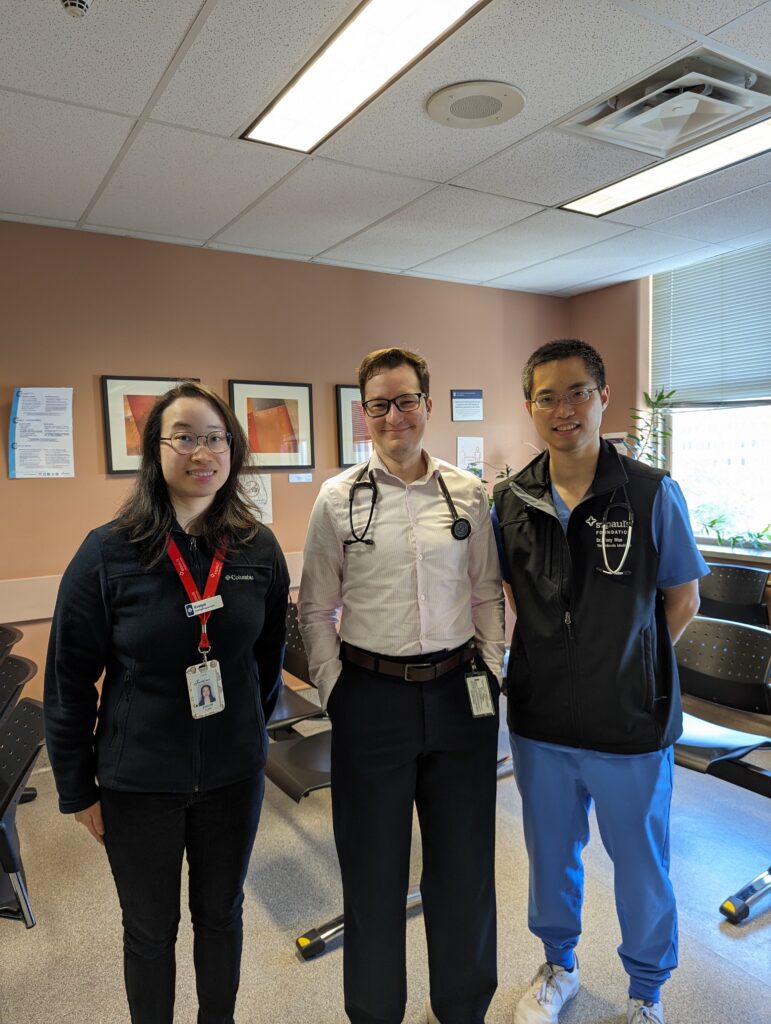Providence staff and clinicians have received funding for four new projects that will help detect cardiac arrest, improve pain management, reduce readmissions after heart failure, and improve clinicians’ ability to offer value-based care. These projects were funded by the B.C. Ministry of Health as part of the Innovation Pathway Program and highlight the culture of innovation within our organization.
Do you have an idea or a project that fits the criteria for this program? The next intake application deadline is June 28. Learn more
How to apply for the June 28, 2024 intake:
- Review the Innovation Pathway Program Guide. This includes detailed information including a Decision Support Tool which helps consider the fit of proposals for the program.
- Review PHC’s internal prioritization matrix; this is in alignment with the Ministry of Health’s priorities and Fit Against Criteria Matrix found within the Program Guide.
- Contact PHC’s innovation contact for the MoH Innovation Pathway to set up a meeting to discuss your innovation project and the Innovation Pathway: Holly van Heukelom, Senior Manager, Ideas: Forward hvanheukelom@providencehealth.bc.ca
- Complete the fillable PDF Health Innovation Intake Form.
- Complete the Supplemental PHC Checklist for Success. Use the Budget Planning Template if it is helpful.
- Send both the Health Innovation Intake Form and the Supplemental PHC Checklist for Success to Holly at hvanheukelom@providencehealth.bc.ca. Note that all applications directly submitted to the Ministry of Health will be redirected to Holly.
What happens after you apply?
- All intake forms must be submitted to Holly by June 28, 2024. All applications will then be reviewed and compared against PHC’s internal prioritization matrix by PHC’s innovation team, the Innovarium. Holly will reach out to all applicants by July 8, 2024. The top 5 applicants might be asked to make some revisions to their applications and to submit their final intake forms to Holly by July 12, 2024, 12:00pm. Holly will then submit the finalized top 5 intake forms to the Ministry of Health on July 15, 2024.
- In September, after the Ministry of Health has selected the PHC innovation projects to fund, Holly will contact the unsuccessful applicants to discuss alternative funding streams and opportunities that might be a good fit.
Providence’s participation in the Ministry of Health’s Innovation Platform was facilitated by Innovarium. Innovarium is PHC’s innovation engine that connects people, systems, infrastructure, and partners to accelerate health innovation. Learn more at www.providencehealth.bc.ca/innovarium
Successful projects to date
A Wearable Sudden Cardiac Arrest Detection System for BC

Approximately 8,000 people a year experience cardiac arrest in BC. This condition is fatal 90 per cent of the time when it occurs outside a hospital. The goal of this project is to develop a cardiac arrest detection system with capacity to activate 9-1-1. The team will use an existing consumer-grade smart watch to collect data from healthy and palliative care participants, including when they go into cardiac arrest. Using machine learning techniques, the team will develop and validate models to accurately detect cardiac arrest.
“It is an honour for our project to be selected for the Ministry of Health Innovation Pathway. It highlights the value placed on identifying innovative methods to improve outcomes from cardiac arrest, which unfortunately occur all too commonly in BC.” ~ Dr. Brian Grunau, Emergency Physician, St. Paul’s Hospital, Co-Director, BC Resuscitation Research Collaborative (BC RESURECT), Assistant Professor, UBC Department of Emergency Medicine, Scientist, Centre for Advancing Health Outcomes.
Enhancing the patient record with patient-reported outcomes: a key step to enable Value-Based Health Care

The use of patient-reported outcome measures (PROMs) in shared decision-making with patients is one way to ensure the health-care system is delivering health outcomes that matter to patients, which is the purpose of Providence’s Value-Based Health Care (VBHC) team. For PROMs to be a useful tool for decision-making, they need to be seen in context of other clinical data and its changes over time.
This project will build and embed PROMs visualizations in the Cerner record with the rest of the patient’s chart, making it easier for clinicians to access. Working across multiple PHC departments and clinics on this initiative, the team will facilitate the use of health outcome data for point-of-care interactions and to ensure the solution meets clinical needs.
If you are interested in providing clinical input or want to learn more, please contact VBHC@providencehealth.bc.ca
“This work will help us take some significant steps to help with clinical adoption and meaningful use of health outcome data, to help achieve health and value for patients. Enabling our organization to practice value-based health care is a strategic priority for PHC in our Mission: Forward Strategic Plan, and to have the Ministry recognize the merit, rigour, and innovation of our project is really meaningful.” ~ Kathy Ho, RD, Clinical Informatics Manager, Value-Based Health Care.
Mobile Interventional Pain Team: Portable Cryoneurolysis

Cryoneurolysis is a treatment for acute and chronic pain. In cryoneurolysis, extreme cold is applied to temporarily stop nerves from sending immediate pain signals. As part of this project, members of the departments of Anesthesiology, Interventional Radiology, and Physical Medicine and Rehabilitation are collaborating to form a mobile interventional pain team. They are using a handheld cryoneurolysis device to offer rapid, bedside pain relief for inpatients. This new service can benefit many different types of patients: post-surgical, those suffering from cancer pain, those in palliative care, and people living with complex chronic pain.
“Our multi-disciplinary team is incredibly appreciative of the Ministry of Health for funding our project to evaluate and test the use of a portable cryoneurolysis device in the bedside treatment of pain for inpatients. This innovative solution would offer targeted, timely and
long-lasting pain relief with the potential to improve patients’ hospital stay and facilitate discharge via opioid reduction and enhanced analgesia.” ~ Dr. Michael Jew, anesthesiologist, Providence Health Care.
Reducing Readmissions of Patients with Heart Failure by Pharmacist-Led Medication Optimization

This project is pairing two innovative clinics at St. Paul’s Hospital – the Post-Discharge Medicine Clinic and the Pharmacist-led Rapid Medication Optimization for Heart Failure clinic. Together, the two clinics want to improve medication management for patients recently discharged from a heart failure hospitalization. The objectives of this project are to reduce readmission of these high-risk patients by getting them on the best medications for them, and to keep them feeling well.
“This innovation is critically needed to improve outcomes for our patients and could not take off without the support from the MoH Innovation Pathway. This support will enable us to test the implementation of our innovation, which will inform and justify adaptation and ultimately the sustainability and scaling of this multidisciplinary collaboration.” ~ Dr. Ricky Turgeon, Clinical Pharmacy Specialist, St. Paul’s Hospital, Scientist | Centre for Advancing Health Outcomes, Assistant Professor | CORE | Faculty of Pharmaceutical Sciences, Associate Member | Department of Medicine (Division of Cardiology)
Innovation and partnerships are critical for the long-term sustainability and improvement of B.C.’s health-care system. The B.C. Ministry of Health and its partners are working to advance new and effective ideas to support a sustainable and innovative health care system through multiple pathways. The Ministry is committed to harnessing the knowledge and expertise of those working in the health system to develop innovative solutions. The Health Innovation Pathway program was established in 2022 to support the testing of promising innovations in clinical settings

